‘The importance of giving back’: Senator Mockler bids farewell to the Red Chamber
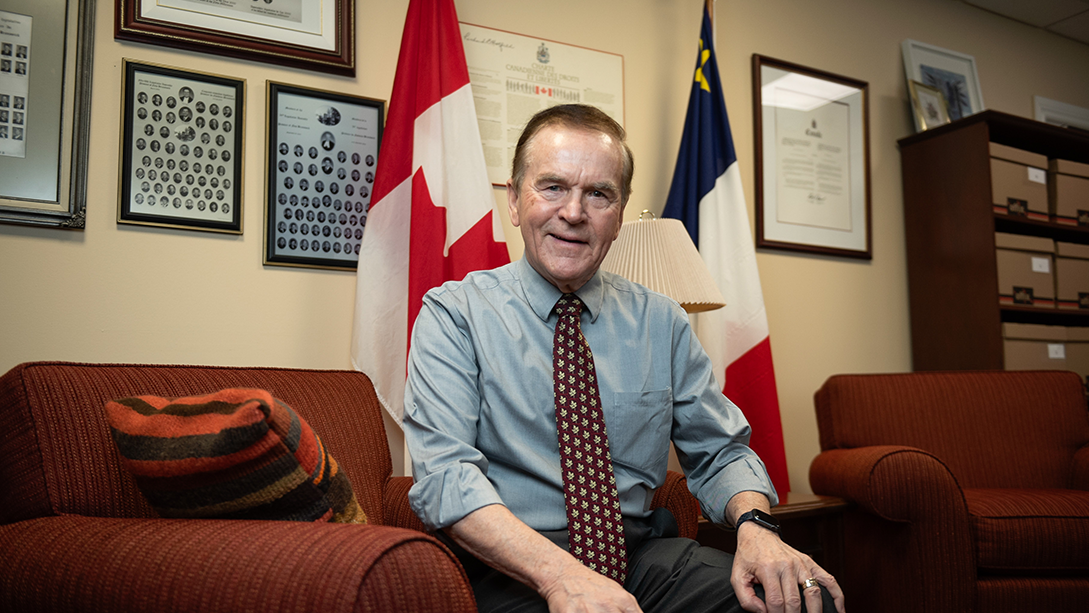
Growing up in a small home without plumbing or electricity, Senator Percy Mockler never dreamt that he would one day have a seat in the Upper Chamber.
The francophone from Saint-Léonard, New Brunswick, was appointed to the Senate in 2009 following a long political career as an MLA, cabinet minister, and organizer for former New Brunswick premier Bernard Lord and the late Brian Mulroney.
Ahead of his retirement on April 14, 2024, Senator Mockler reflects on how his humble upbringing inspired a life in politics.
Can you tell us more about your childhood?
I grew up with my single mother, Marie; my sister, Shirley; and my grandfather and grandmother. We were all living on welfare in a small house my grandfather built. People called it “Mockler’s Welfare Alley,” but for me our 26-feet-by-28-feet house was my home.
When I compare my childhood dwelling to the Upper House where I have served for 15 years, it’s quite a difference.
How did your upbringing influence your politics?
The Saint-Léonard community was very good to my family, notwithstanding the fact that we were on welfare. Our community would give my family a box of food every Christmas and Easter. My mother and grandparents always said that what we were given, we had to give back, and to treat others the way we wanted to be treated. This instilled in me the importance of giving back.
Even though my mother could not read or write, she would always say that the way out of welfare was through education. When I graduated high school, my family didn’t have money to send me to college, but there was a government bursary program for low-income families. My first bursary was less than $1,000, which I spent on installing water and sewage in my family home.
My mother thought I was going to college when I was actually working as a tree planter. Then one day in October she said, “You go to college, but you don’t have any books. Are you that intelligent?” I admitted that I wasn’t going to college, and I had used my bursary to install the sink and toilet.
She told me I cheated the system. I responded by saying that before any civil servants found out, I would be able to pay it back. She was not happy, and I ended up enrolling in school by the end of the month.
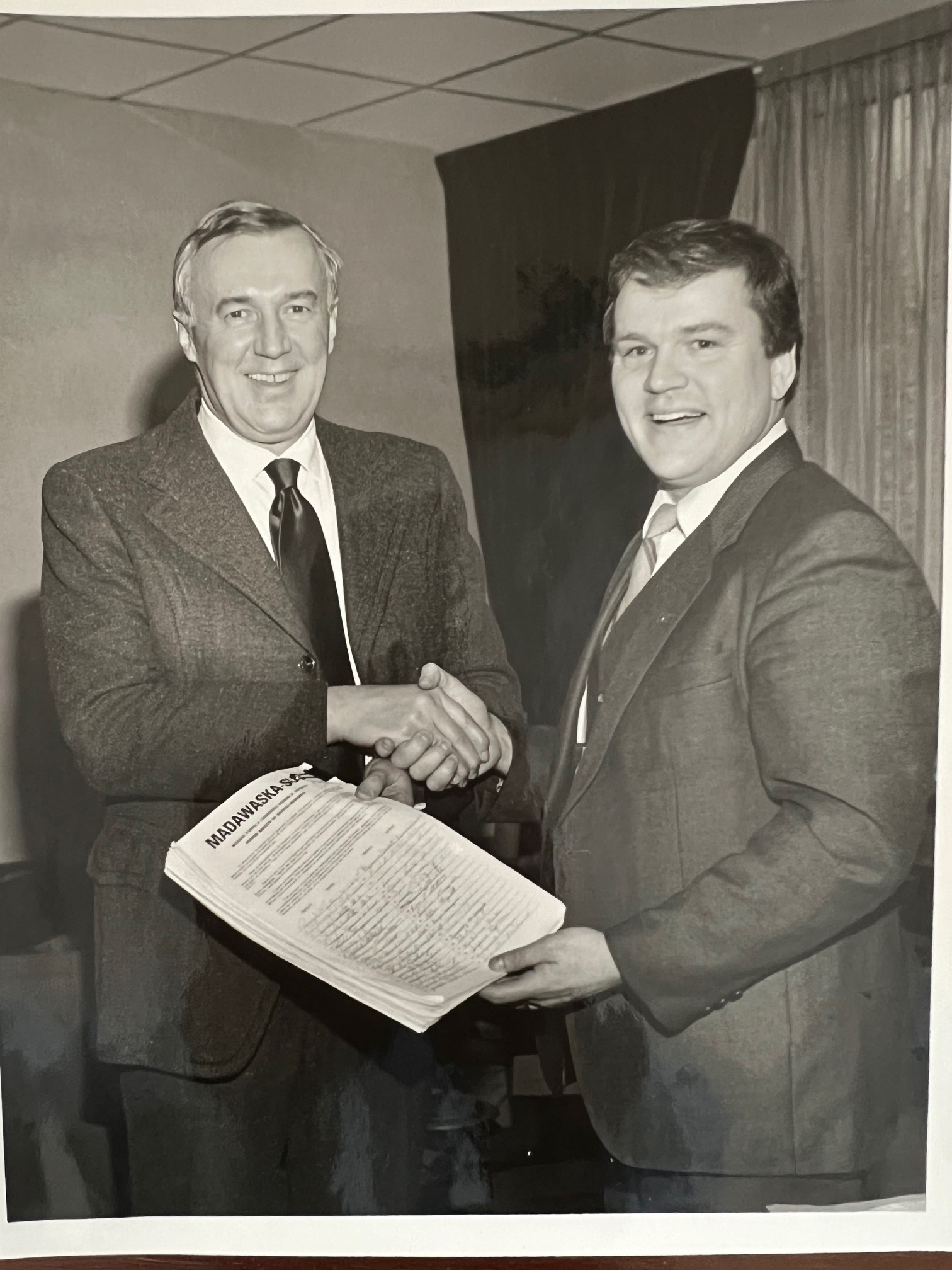
After winning the nomination for his riding, Percy Mockler, right, shakes hands with Richard Hatfield, then-leader of the New Brunswick Progressive Conservative Party. The Progressive Conservatives went on to win the election in 1982, and Mr. Mockler served more than 20 years as an MLA. (Photo credit: Office of the Senator Percy Mockler)
 A first of many political wins: A teenage Percy Mockler is hoisted onto the shoulders of his classmates Donald Cyr, Paul Bourgoin, George Caron and Jack Muckler after he’s elected high school president in Saint-Léonard, New Brunswick. (Photo credit: Office of the Senator Percy Mockler)
A first of many political wins: A teenage Percy Mockler is hoisted onto the shoulders of his classmates Donald Cyr, Paul Bourgoin, George Caron and Jack Muckler after he’s elected high school president in Saint-Léonard, New Brunswick. (Photo credit: Office of the Senator Percy Mockler)
Do you still live on that land?
Yes, the original house ended up being torn down, and then my wife and I built the home where we now live. While rebuilding our house, I promised my mother two things: enough space for the family to stay, and two toilets!
You said your family instilled in you the value of giving back to society. Why did you choose politics as a means of doing so?
The launching pad for my political career was in high school when I became the president of my school in Saint-Léonard. My dedication to public service continued throughout university. When I was a student at the University of Moncton, I would drive three hours from Moncton to Saint-Léonard on the weekends to do income tax returns. I charged $5 for people who were low-income, and nothing for people living on welfare.
After I graduated, my wife and I bought a little business in Saint-Léonard. During that time, I was asked to serve on different boards, and I was also elected to the school board. I served as chair in the early 1980s.
In the lead-up to the 1982 election in New Brunswick, the Progressive Conservative Party had no candidates in my riding. I decided to run and, to my surprise, I won. I was 32 years old and the youngest MLA at the time. I lost the 1987 election to the Liberal candidate, Pierrette Ringuette, who would later become my colleague in the Senate, but I won the following five elections.
You were responsible for several ministerial portfolios as a provincial politician. Which one were you most passionate about and why?
Former premier Bernard Lord’s vision changed governance in New Brunswick. He reduced the number of cabinet ministers and, as a result, he asked me to be responsible for many departments in my seven years as minister.
Without a doubt the one that I cherished the most was what was known as the “welfare department.” We changed the name to the Ministry of Social Development. I had lived that portfolio.
You were appointed to the Red Chamber in 2009. How did your long career in politics serve you in the Senate?
I’ve been inspired by former premier Lord, as well as former prime ministers Stephen Harper and the late Brian Mulroney.
In my mind, Mr. Lord’s vision for modernizing New Brunswick was immaculate. Those pillars that we built are still serving Acadian, anglophone and First Nation communities today. Mr. Mulroney encouraged me to look at politics from a global perspective. And with Mr. Harper, it was about recognizing who we are in Canada, including Quebec, Acadian people and First Nation communities. Mr. Harper’s policies and vision for a better Canada were instrumental.
Collectively, these three leaders motivated me throughout my Senate career.
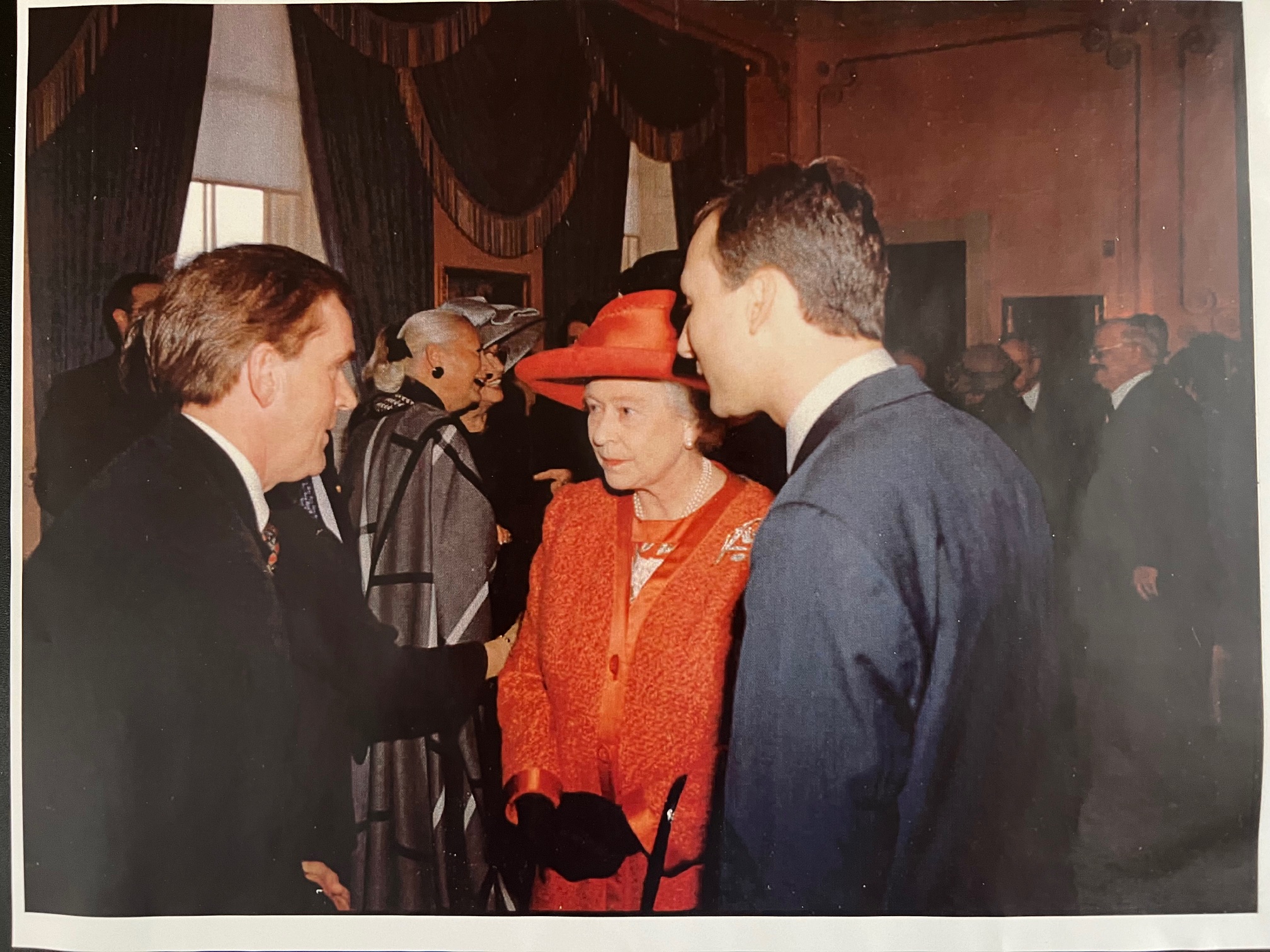 Percy Mockler, then-New Brunswick Minister of Transportation, accompanied by Bernard Lord, then-New Brunswick premier, meet Queen Elizabeth II in Fredericton, New Brunswick, as part of her Golden Jubilee tour of the Commonwealth in 2002. (Photo credit: Office of the Senator Percy Mockler)
Percy Mockler, then-New Brunswick Minister of Transportation, accompanied by Bernard Lord, then-New Brunswick premier, meet Queen Elizabeth II in Fredericton, New Brunswick, as part of her Golden Jubilee tour of the Commonwealth in 2002. (Photo credit: Office of the Senator Percy Mockler)
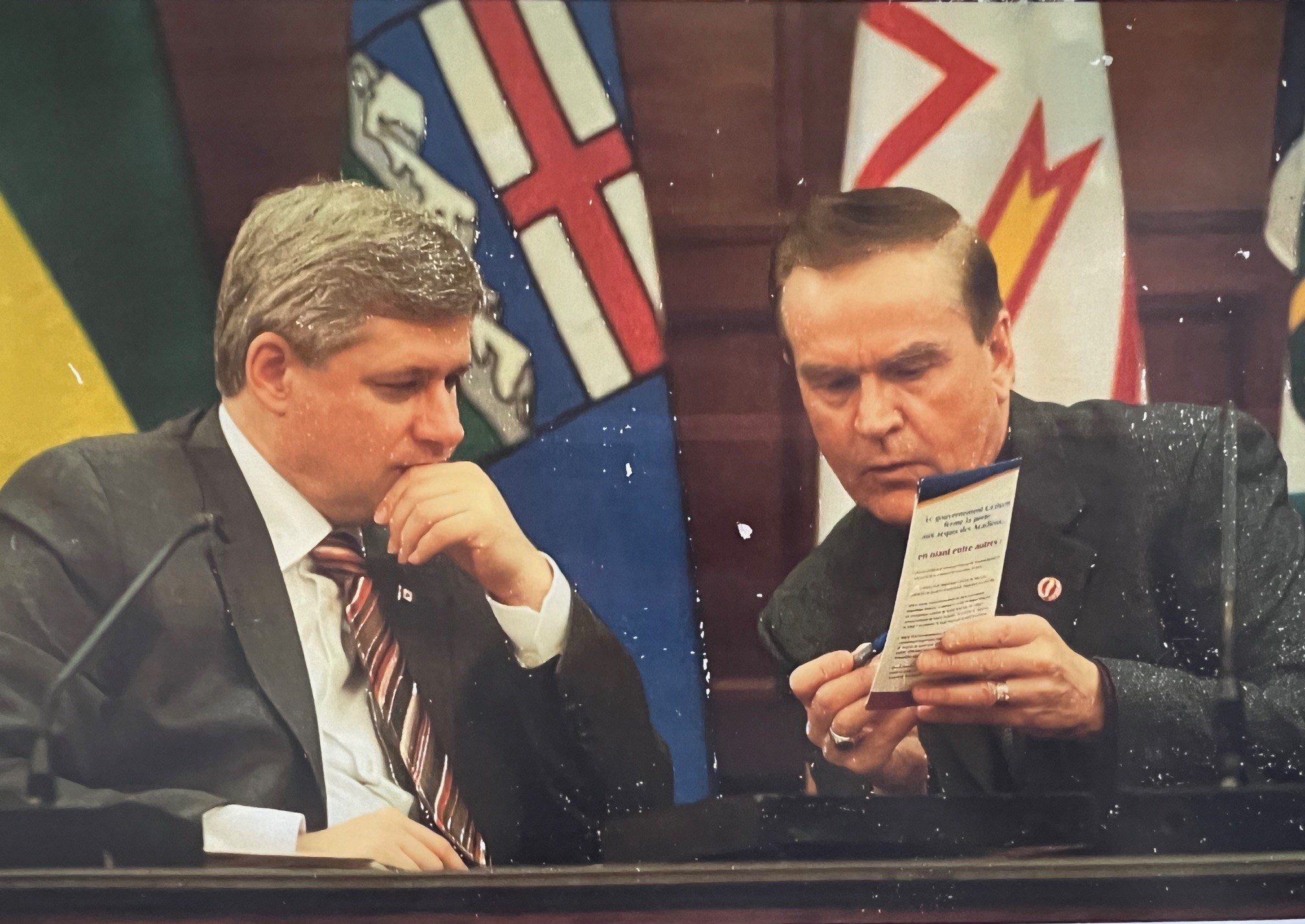 Senator Mockler meets with then-prime minister Stephen Harper during a Conservative Party caucus meeting. (Photo credit: Office of the Senator Percy Mockler)
Senator Mockler meets with then-prime minister Stephen Harper during a Conservative Party caucus meeting. (Photo credit: Office of the Senator Percy Mockler)
Throughout your time chairing the Senate Committee on National Finance, you have overseen the publication of 50 reports. Which ones stand out to you?
First, I have to say that growing up, my family’s monthly welfare cheque was $140. I never thought that I would become chair of the finance committee for seven years.
For me, the highlights were our reports on the troubled Phoenix pay system, the federal government’s response to COVID-19 and our calls to adopt a national seniors strategy.
Finally, I see our report on fair, simple and competitive taxation as a way to continue modernizing Canada.
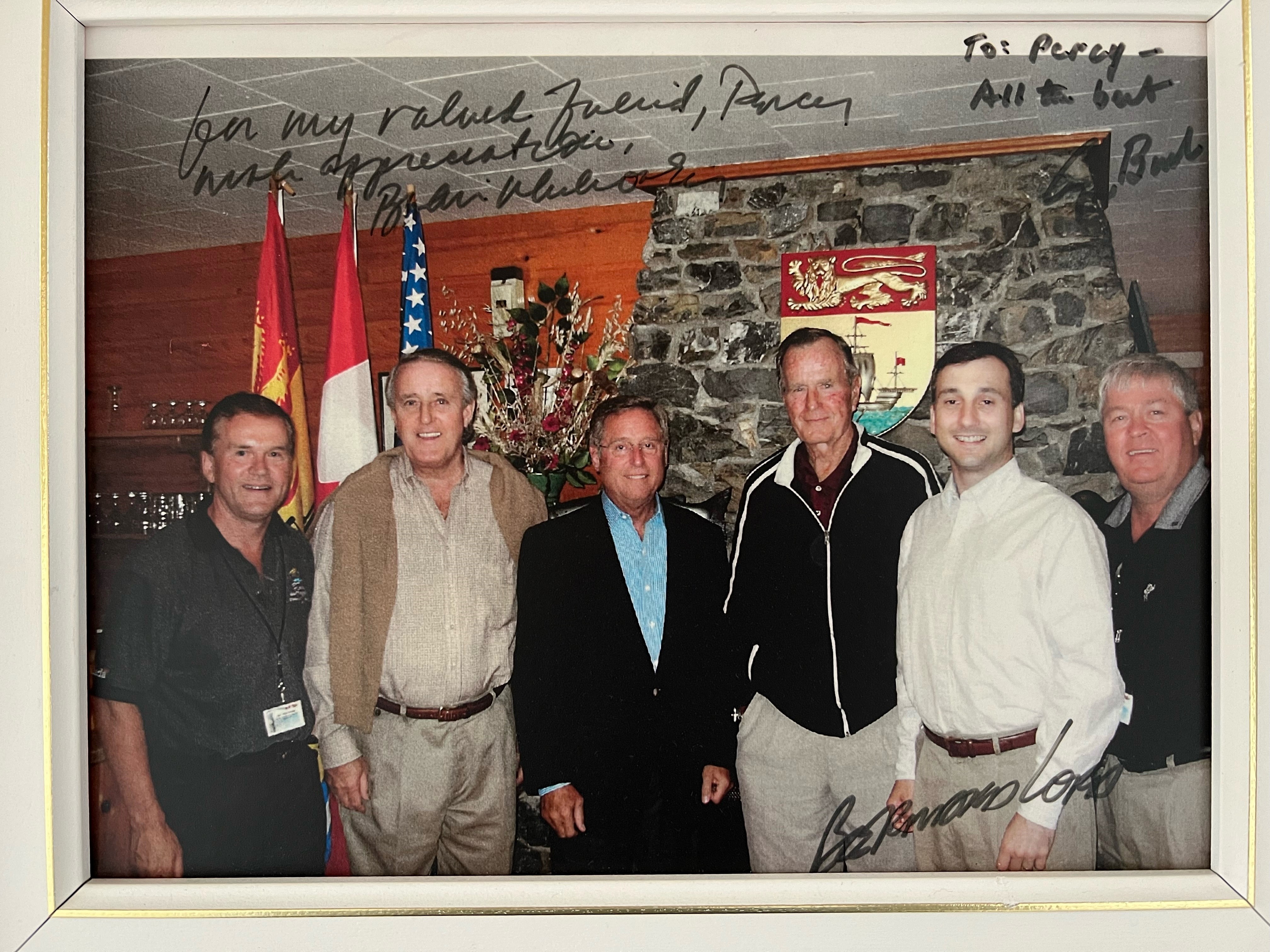
You have also been a member of several other Senate committees. Do you have any other highlights from your committee work?
One highlight for me was the report on bee health, which I oversaw as chair of the Senate Committee on Agriculture in 2015. We wouldn’t have quality food if it weren’t for bees.
Then there was our 2009 report the Canadian Forest Sector: Past, Present, Future, which highlighted the strength of Canada’s sustainable forestry sector.
As a member of the Senate Committee on Official Languages, I also worked on Bill C-13, which updated the Official Languages Act to better protect the French language. This bill is a jewel for all Canadians from coast to coast to coast. It’s just as much about protecting minority anglophone communities.
You worked for many years in Centre Block on Parliament Hill before the building was closed for rehabilitation. Do you have any fond memories from your time in this building?
I have fond memories of bringing people from my hometown to Ottawa and taking time to showcase Centre Block. I remember once I brought one of my campaign organizers to Ottawa and I arranged for him to meet Stephen Harper, who was prime minister at the time.
I have always believed that Parliament Hill is the house of the people, regardless of your income status.
 Senator Mockler with his wife, Suzanne Soucy, and their grandchildren at home in New Brunswick. (Photo credit: Office of the Senator Percy Mockler)
Senator Mockler with his wife, Suzanne Soucy, and their grandchildren at home in New Brunswick. (Photo credit: Office of the Senator Percy Mockler)
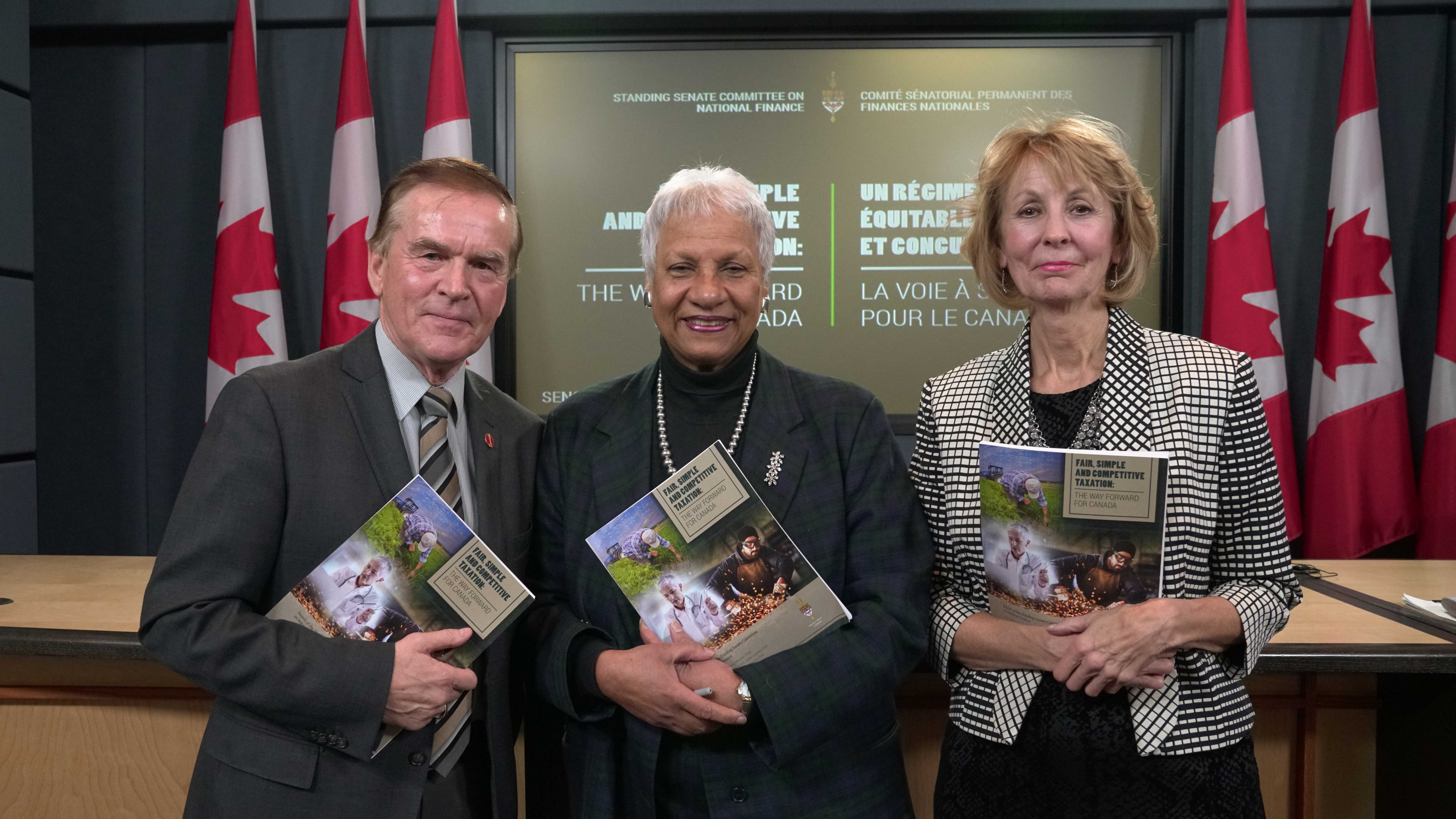 From left, Senator Mockler, former senator Anne C. Cools and Senator Elizabeth Marshall during a 2017 press conference to launch a report by the Senate Committee on National Finance on Canada’s tax system.
From left, Senator Mockler, former senator Anne C. Cools and Senator Elizabeth Marshall during a 2017 press conference to launch a report by the Senate Committee on National Finance on Canada’s tax system.
The University of Moncton’s Edmundston campus has a scholarship in your name. How did that come about?
In 2002, the university hosted a roast of politicians. They asked me where I thought the money from ticket sales should go and I said I wanted to start a new scholarship for children of single mothers. The annual Percy-Mockler Scholarship still exists today to help the children of single parents pursue post-secondary studies.
In November 2023, my wife and I were at the grocery store when two women, a mother and daughter, approached us and asked if I was Percy Mockler. The mother said, “I just want to say thank you.” She told me that her daughter benefitted from my scholarship in university, and she’s now working as a nurse.
What are you planning to do next?
Some people in Saint-Léonard still think I’m their elected official, especially the older generations who have been seeing me in the community for more than 40 years. I’ll continue working for them if God permits me. I want to continue to make our province a better place to work, live and raise our children.

Watch Senator Mockler’s tributes and farewell speech in the Senate Chamber.
The Honourable Percy Mockler retired from the Senate of Canada in April 2024. Visit the Library of Parliament's Parlinfo website to learn more about his work in Parliament.
Related articles
Tags
Committee news
‘The importance of giving back’: Senator Mockler bids farewell to the Red Chamber

Growing up in a small home without plumbing or electricity, Senator Percy Mockler never dreamt that he would one day have a seat in the Upper Chamber.
The francophone from Saint-Léonard, New Brunswick, was appointed to the Senate in 2009 following a long political career as an MLA, cabinet minister, and organizer for former New Brunswick premier Bernard Lord and the late Brian Mulroney.
Ahead of his retirement on April 14, 2024, Senator Mockler reflects on how his humble upbringing inspired a life in politics.
Can you tell us more about your childhood?
I grew up with my single mother, Marie; my sister, Shirley; and my grandfather and grandmother. We were all living on welfare in a small house my grandfather built. People called it “Mockler’s Welfare Alley,” but for me our 26-feet-by-28-feet house was my home.
When I compare my childhood dwelling to the Upper House where I have served for 15 years, it’s quite a difference.
How did your upbringing influence your politics?
The Saint-Léonard community was very good to my family, notwithstanding the fact that we were on welfare. Our community would give my family a box of food every Christmas and Easter. My mother and grandparents always said that what we were given, we had to give back, and to treat others the way we wanted to be treated. This instilled in me the importance of giving back.
Even though my mother could not read or write, she would always say that the way out of welfare was through education. When I graduated high school, my family didn’t have money to send me to college, but there was a government bursary program for low-income families. My first bursary was less than $1,000, which I spent on installing water and sewage in my family home.
My mother thought I was going to college when I was actually working as a tree planter. Then one day in October she said, “You go to college, but you don’t have any books. Are you that intelligent?” I admitted that I wasn’t going to college, and I had used my bursary to install the sink and toilet.
She told me I cheated the system. I responded by saying that before any civil servants found out, I would be able to pay it back. She was not happy, and I ended up enrolling in school by the end of the month.

After winning the nomination for his riding, Percy Mockler, right, shakes hands with Richard Hatfield, then-leader of the New Brunswick Progressive Conservative Party. The Progressive Conservatives went on to win the election in 1982, and Mr. Mockler served more than 20 years as an MLA. (Photo credit: Office of the Senator Percy Mockler)
 A first of many political wins: A teenage Percy Mockler is hoisted onto the shoulders of his classmates Donald Cyr, Paul Bourgoin, George Caron and Jack Muckler after he’s elected high school president in Saint-Léonard, New Brunswick. (Photo credit: Office of the Senator Percy Mockler)
A first of many political wins: A teenage Percy Mockler is hoisted onto the shoulders of his classmates Donald Cyr, Paul Bourgoin, George Caron and Jack Muckler after he’s elected high school president in Saint-Léonard, New Brunswick. (Photo credit: Office of the Senator Percy Mockler)
Do you still live on that land?
Yes, the original house ended up being torn down, and then my wife and I built the home where we now live. While rebuilding our house, I promised my mother two things: enough space for the family to stay, and two toilets!
You said your family instilled in you the value of giving back to society. Why did you choose politics as a means of doing so?
The launching pad for my political career was in high school when I became the president of my school in Saint-Léonard. My dedication to public service continued throughout university. When I was a student at the University of Moncton, I would drive three hours from Moncton to Saint-Léonard on the weekends to do income tax returns. I charged $5 for people who were low-income, and nothing for people living on welfare.
After I graduated, my wife and I bought a little business in Saint-Léonard. During that time, I was asked to serve on different boards, and I was also elected to the school board. I served as chair in the early 1980s.
In the lead-up to the 1982 election in New Brunswick, the Progressive Conservative Party had no candidates in my riding. I decided to run and, to my surprise, I won. I was 32 years old and the youngest MLA at the time. I lost the 1987 election to the Liberal candidate, Pierrette Ringuette, who would later become my colleague in the Senate, but I won the following five elections.
You were responsible for several ministerial portfolios as a provincial politician. Which one were you most passionate about and why?
Former premier Bernard Lord’s vision changed governance in New Brunswick. He reduced the number of cabinet ministers and, as a result, he asked me to be responsible for many departments in my seven years as minister.
Without a doubt the one that I cherished the most was what was known as the “welfare department.” We changed the name to the Ministry of Social Development. I had lived that portfolio.
You were appointed to the Red Chamber in 2009. How did your long career in politics serve you in the Senate?
I’ve been inspired by former premier Lord, as well as former prime ministers Stephen Harper and the late Brian Mulroney.
In my mind, Mr. Lord’s vision for modernizing New Brunswick was immaculate. Those pillars that we built are still serving Acadian, anglophone and First Nation communities today. Mr. Mulroney encouraged me to look at politics from a global perspective. And with Mr. Harper, it was about recognizing who we are in Canada, including Quebec, Acadian people and First Nation communities. Mr. Harper’s policies and vision for a better Canada were instrumental.
Collectively, these three leaders motivated me throughout my Senate career.
 Percy Mockler, then-New Brunswick Minister of Transportation, accompanied by Bernard Lord, then-New Brunswick premier, meet Queen Elizabeth II in Fredericton, New Brunswick, as part of her Golden Jubilee tour of the Commonwealth in 2002. (Photo credit: Office of the Senator Percy Mockler)
Percy Mockler, then-New Brunswick Minister of Transportation, accompanied by Bernard Lord, then-New Brunswick premier, meet Queen Elizabeth II in Fredericton, New Brunswick, as part of her Golden Jubilee tour of the Commonwealth in 2002. (Photo credit: Office of the Senator Percy Mockler)
 Senator Mockler meets with then-prime minister Stephen Harper during a Conservative Party caucus meeting. (Photo credit: Office of the Senator Percy Mockler)
Senator Mockler meets with then-prime minister Stephen Harper during a Conservative Party caucus meeting. (Photo credit: Office of the Senator Percy Mockler)
Throughout your time chairing the Senate Committee on National Finance, you have overseen the publication of 50 reports. Which ones stand out to you?
First, I have to say that growing up, my family’s monthly welfare cheque was $140. I never thought that I would become chair of the finance committee for seven years.
For me, the highlights were our reports on the troubled Phoenix pay system, the federal government’s response to COVID-19 and our calls to adopt a national seniors strategy.
Finally, I see our report on fair, simple and competitive taxation as a way to continue modernizing Canada.

You have also been a member of several other Senate committees. Do you have any other highlights from your committee work?
One highlight for me was the report on bee health, which I oversaw as chair of the Senate Committee on Agriculture in 2015. We wouldn’t have quality food if it weren’t for bees.
Then there was our 2009 report the Canadian Forest Sector: Past, Present, Future, which highlighted the strength of Canada’s sustainable forestry sector.
As a member of the Senate Committee on Official Languages, I also worked on Bill C-13, which updated the Official Languages Act to better protect the French language. This bill is a jewel for all Canadians from coast to coast to coast. It’s just as much about protecting minority anglophone communities.
You worked for many years in Centre Block on Parliament Hill before the building was closed for rehabilitation. Do you have any fond memories from your time in this building?
I have fond memories of bringing people from my hometown to Ottawa and taking time to showcase Centre Block. I remember once I brought one of my campaign organizers to Ottawa and I arranged for him to meet Stephen Harper, who was prime minister at the time.
I have always believed that Parliament Hill is the house of the people, regardless of your income status.
 Senator Mockler with his wife, Suzanne Soucy, and their grandchildren at home in New Brunswick. (Photo credit: Office of the Senator Percy Mockler)
Senator Mockler with his wife, Suzanne Soucy, and their grandchildren at home in New Brunswick. (Photo credit: Office of the Senator Percy Mockler)
 From left, Senator Mockler, former senator Anne C. Cools and Senator Elizabeth Marshall during a 2017 press conference to launch a report by the Senate Committee on National Finance on Canada’s tax system.
From left, Senator Mockler, former senator Anne C. Cools and Senator Elizabeth Marshall during a 2017 press conference to launch a report by the Senate Committee on National Finance on Canada’s tax system.
The University of Moncton’s Edmundston campus has a scholarship in your name. How did that come about?
In 2002, the university hosted a roast of politicians. They asked me where I thought the money from ticket sales should go and I said I wanted to start a new scholarship for children of single mothers. The annual Percy-Mockler Scholarship still exists today to help the children of single parents pursue post-secondary studies.
In November 2023, my wife and I were at the grocery store when two women, a mother and daughter, approached us and asked if I was Percy Mockler. The mother said, “I just want to say thank you.” She told me that her daughter benefitted from my scholarship in university, and she’s now working as a nurse.
What are you planning to do next?
Some people in Saint-Léonard still think I’m their elected official, especially the older generations who have been seeing me in the community for more than 40 years. I’ll continue working for them if God permits me. I want to continue to make our province a better place to work, live and raise our children.

Watch Senator Mockler’s tributes and farewell speech in the Senate Chamber.
The Honourable Percy Mockler retired from the Senate of Canada in April 2024. Visit the Library of Parliament's Parlinfo website to learn more about his work in Parliament.


